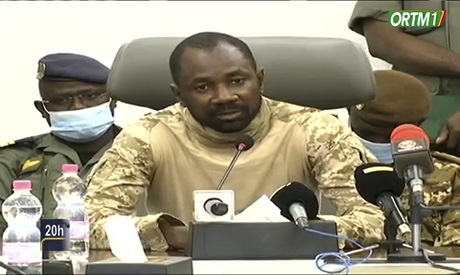
Seen on national broadcaster ORTM TV, Col. Assimi Goita, one of the soldiers identifying themselves as the National Committee for the Salvation of the People, sits with others during a televised broadcast on Wednesday, Aug. 19, 2020 in Bamako, Mali. (Photo: AP)
A colonel in Mali's army says he's now in charge of the West African country, declaring himself chairman of the junta that forced the democratically elected but unpopular president to resign.
Col. Assimi Goita, one of the five military officers who announced this week's coup on the state broadcaster ORTM, declared himself chairman of the junta now in power.
``By making this intervention (the coup), we have put Mali first,'' Goita said in a broadcast that showed him meeting with the top officials of government ministries and urging them to resume work Thursday.
``Mali is in a sociopolitical and security crisis,'' he said. ``There is no more room for mistakes.''
Across Africa and around the world, leaders have strongly condemned this week's coup, calling for an immediate return to civilian rule and the release of ex-President Ibrahim Boubacar Keita and his prime minister, Boubou Cisse.
The two leaders were detained by mutinous soldiers on Tuesday after they surrounded the president's private residence in Bamako and fired shots into the air. Under duress, Keita later announced his resignation on state television, saying he did not want any blood to be shed to keep him in power.
Observers fear the political upheaval will allow Islamic extremists in Mali to expand their reach. A power vacuum after a previous coup in 2012 allowed al-Qaida-linked militants to take over major towns in northern Mali where they implemented their strict interpretation of Islamic law. Former colonizer France, which maintains strong economic and political ties to Mali, later led a military intervention to oust them from power in 2013.
But those jihadists have since regrouped and launched relentless attacks on the Malian military, as well as U.N. peacekeepers and regional forces trying to stabilize the volatile country. The extremists have moved southward, inflaming tensions between ethnic groups in central Mali.
Goita, the new strongman, had been head of a special military unit based in central Mali. He also had taken part in the annual Flintlock training organized by the U.S. military to help Mali and other Sahel countries better fight extremists.
Keita won the 2013 election in a landslide, emerging from a field of more than two dozen candidates to get more than 77% of the vote. He won reelection five years later, but his political fortunes have tumbled in the past year.
While Mali's Islamic insurgency started before Keita took office, many felt his government did not do enough to end the violence. The extremists only expanded their reach, infiltrating the central part of the country where they inflamed tensions between ethnic groups. Attacks have dramatically increased over the past year.
Opposition to Keita's government rose further after legislative elections earlier this year that dozens of candidates disputed. In a conciliatory gesture, Keita said he was open to holding the vote again in contested areas. But by June, demonstrators were taking to the streets en masse calling for his ouster.
Analysts said there were few signs that opposition leaders were aware of the coup plot, though they now stand to benefit through an opportunity to serve in any transitional government that emerges.
Short link: